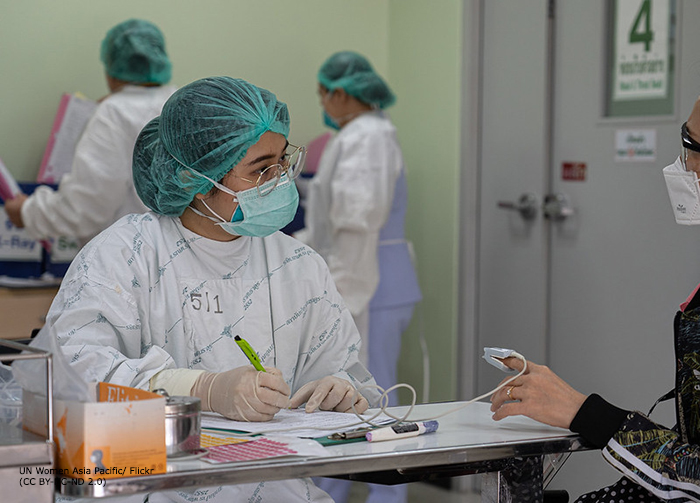
Building Pandemic Preparedness in the Greater Mekong Subregion
Cambodia, the Lao People’s Democratic Republic (PDR), Myanmar and Viet Nam, CLMV countries in the Greater Mekong Subregion (GMS), have experienced a relatively smaller number of reported cases and fatalities of the coronavirus disease (COVID-19). As of 22 June, Cambodia reported 129 confirmed cases, Lao PDR reported 19 confirmed cases, and Viet Nam reported 349 confirmed cases. All three countries recorded 0 deaths from COVID-19. In Myanmar, while there have been 6 deaths, only 286 confirmed cases were reported.
Strengthening the Subregion’s Capacity to Manage an Outbreak
The GMS region is a global hotspot for the transmission of emerging, reemerging, and epidemic prone diseases, particularly zoonoses. The Asian Development Bank (ADB) has been working with these countries for more than a decade to build strong national public health systems with capacity to prevent, detect, and respond to public health threats, including the control of communicable diseases. These investments have contributed to containing the COVID-19 outbreak, according to Mr. Rikard Elfving, a Senior Social Sector Specialist in ADB’s Southeast Asia Department.
“Strengthening communicable disease control has been a priority for the region for a longer period of time,” said Mr. Elfving. “Fighting communicable disease threats requires strong capacity for surveillance, risk assessment, laboratory diagnostics, risk communications, and response across both the public health and animal health sectors. These have proven to be very relevant in the context of SARS, MERS, and now, COVID-19.”
“GMS countries understand that the cost of inaction would be much higher if strategic investments in the health system is not prioritized,” added Mr. Elfving. “A reactive approach to preventing the spread of any public health threats would have a bigger economic impact than proactively building up core systems that are able to detect, respond, and prevent public health threats. Consolidating health security as regional public good that carries benefits for the people across the subregion is key. “
How Project Flexibility and Adaptability Helped Save Lives in a Pandemic
Under the GMS Health Security Project, ADB has been working with governments to address weaknesses in their health systems, and promote cross-country cooperation to improve national and international health security. The flexibility and adaptability of the GMS Health Security Project allows funds to be quickly reprogrammed to respond to epidemic outbreaks and/or major public health emergencies. When COVID-19 struck, the project rapidly reallocated existing funds and provided additional financing to support emergency response measures. This meaningfully contributed to early-stage efforts to minimize the spread of COVID-19, and save lives (read more: essential medical equipment procured through the GMS Health Security Project). The project design also allowed for expanded activities beyond the original project scope and geographical catchment area during health emergencies, which allowed for the rapid dispatch of thermal scanners to specific points of entry. To date, the project has secured 12 border crossing points in Cambodia and the Wattay International Airport in Lao PDR with thermal scanners.
Lao PDR recently received a $20 million financing boost under the GMS Health Security Project. “This will support the country in maintaining maximum preparedness and keep its health care system ready to respond to any resurgence of COVID-19. Myanmar has also requested for similar support,” shared Mr. Elfving.
Further Support for Pandemic Response
ADB has also supported rapid COVID-19 response through a supplementary technical assistance grant, Strengthening Regional Health Cooperation in the GMS. This assistance is helping GMS countries strengthen their pandemic response capacities, and is promoting cross-border collaboration and the protection of vulnerable populations. It also aims to strengthen the subregion’s capacity against future zoonotic epidemics through a One Health strategy, which looks at linkages between animal and human health. This will help the region address the multisectoral challenge involving food security, environment and health, within governments.
Making Health as a Regional Public Good a Core Priority
Since 2011, the GMS region has avoided major outbreaks of communicable diseases of international concern, but much remains to be done. Going forward, the region must continue to allocate resources to ensure preparedness for future public health threats. This includes addressing the health needs of populations of migrant and mobile persons.
“GMS takes its commitment to the sustainable development goal target of universal health coverage seriously. We are now working on a health support project for migrant and mobile persons to increase their access to essential health services and support their health needs. This is a key priority under the GMS Health Cooperation Strategy for 2019 – 2023,” noted Mr. Elfving.
As the GMS Health Security Project comes to a close in September 2022, countries are keen to continue working with ADB to strengthen their core capacity to respond to the next pandemic. The draft GMS Strategy 2030 reinforces health as a regional public good. The current COVID-19 crisis illustrates the importance of making this a core priority for the subregion.
